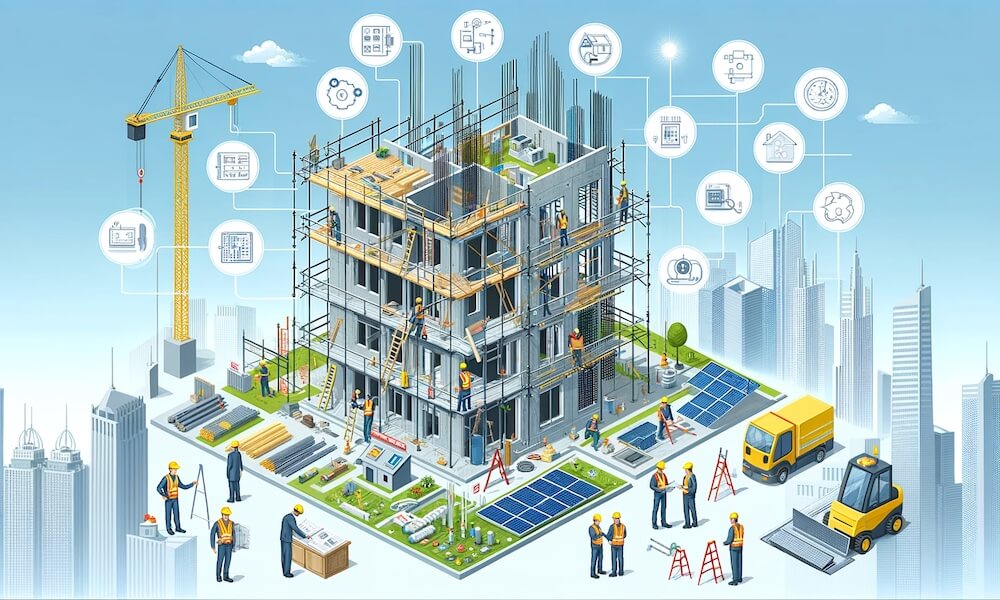Building permit regulations are a complex but essential part of any construction project. As a property developer, you need to know which building regulations apply to your new development. These regulations can vary between local government districts. Staying compliant with all relevant building permits ensures that your projects are completed without delays and fines. It also guarantees the safety and well-being of future occupants.
The Purpose of Building Regulations
Building regulations are in place to ensure that all construction projects meet specific standards for safety, health, and environmental protection. These regulations are designed to:
- Ensure Safety: Building codes ensure the safety of both occupants and the surrounding community. These codes mandate minimum standards for structural integrity, fire safety, electrical systems, plumbing, and other critical aspects of a building.
- Promote Accessibility: Regulations ensure that buildings are usable by people with disabilities. This includes requirements for ramps, elevators, and other features.
- Ensure Environmental Protection: More recently, codes have also begun to focus on environmental impact, setting out energy efficiency standards, water conservation measures, and the use of sustainable materials.
Typical Building Codes to Be Aware Of
Building codes specify the minimum acceptable level of safety for constructed objects such as buildings and non-building structures. Some of the most common building codes include:
- International Building Code (IBC): This comprehensive code covers most aspects of building construction, including structural design, fire safety, and accessibility.
- National Electrical Code (NEC): The NEC sets standards for electrical installations to ensure safety and prevent electrical hazards.
- International Plumbing Code (IPC): The IPC establishes rules for plumbing systems to ensure proper sanitation and water safety.
- International Residential Code (IRC): This code is specifically tailored for one- and two-family dwellings and townhomes.
- International Energy Conservation Code (IECC): The IECC provides standards for energy efficiency in buildings, promoting the use of energy-saving materials and methods.
What Permits Do You Usually Need?
The permits required for your project will depend on the type and scope of the work. Common permits often required include:
- Building Permit: This is often the most fundamental permit, granting you permission to begin construction. It may cover various types of work, such as new construction, additions, or alterations.
- Electrical Permit: This permit is typically required for any electrical work beyond simple repairs, such as installing new wiring or upgrading an electrical panel.
- Plumbing Permit: Like the electrical permit, this is necessary for major plumbing installations or renovations.
- Mechanical Permit: This may be required for work on heating, ventilation, and air conditioning (HVAC) systems.
- Demolition Permit: If your project involves demolishing an existing structure, you will likely need this permit.
- Occupancy Permit: Issued after construction is complete, this permit certifies that the building is safe for occupancy and complies with all relevant codes.
The Role of Inspections in Building Regulations
Inspections are an important part of the building permit process. They ensure that all work is performed in compliance with applicable codes and standards. Key inspections include:
- Foundation Inspection: This inspection verifies that the foundation is properly constructed and meets code requirements.
- Framing Inspection: This inspection checks the structural integrity of the framing, including walls, floors, and roofs.
- Electrical and Plumbing Rough-In Inspections: These inspections assess the electrical and plumbing systems before they are concealed behind walls and ceilings.
- Final Inspection: This is a comprehensive inspection to confirm that all aspects of the building meet code and are ready for occupancy.
Common Mistakes and How to Avoid Them
Some common mistakes that can lead to non-compliance include:
Starting Work Without a Permit
Always wait for official approval before beginning any work to avoid penalties and project shutdowns.
Ignoring Zoning Laws
Ensure your proposed construction complies with local zoning requirements, such as setbacks, height restrictions, and land use designations.
Deviating From Approved Plans
Any changes to the approved plans must be submitted for review and approval before implementation.
Ignoring Inspection Requirements
Regular inspections verify compliance and identify issues early on.
Overlooking Permit Renewals
Building permits typically have expiration dates. If your project extends beyond the initial permit period, you may need to apply for a renewal.
Tips for Success
To ensure a smooth and compliant construction process, consider these tips:
- Understand Local Regulations: Local government websites provide detailed information on project types requiring permits, the application process, and associated fees.
- Consult with Professionals: Working with professionals such as architects, engineers, and contractors early in the planning process can be invaluable. Their guidance helps you design a compliant project and streamline the permit application process.
- Start Early: The permit application process can take time, so start early and allow ample time for review and approval.
- Submit Thorough Plans and Documentation: Building permit applications typically require detailed plans, specifications, and supporting documents. Incomplete or inaccurate documentation can lead to permit denials or delays. Online building permit assessments, like eCheck by Archistar can speed up the process. However, this depends on your local authority offering this service.
- Address Issues Immediately: If any issues or violations are identified during inspections, it’s important to address them as soon as possible. Ignoring violations can lead to more severe penalties and project delays.
By understanding the requirements, staying informed about local regulations, and maintaining clear communication with building officials, you’ll find it easier to stay compliant with building permit regulations. If your local building department isn’t using eCheck by Archistar, get them to request a demo to see how it can simplify the process.

